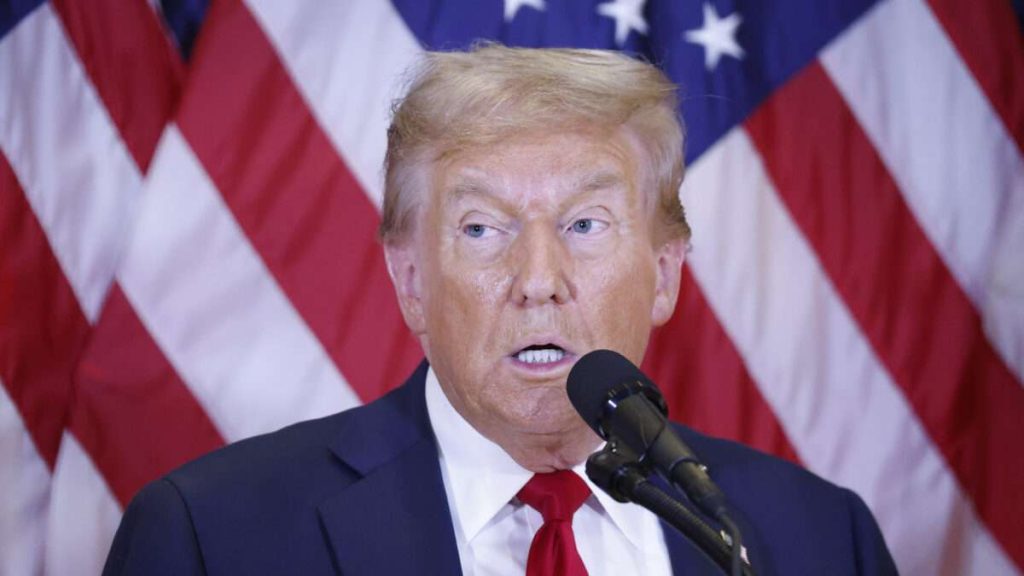10 percent or 20 percent or nonexistent? Donald Trump’s campaign pitch appears to be one of selectively limited government; possibly appointing Elon Musk “secretary of cost-cutting” (more on that here) yet also favoring some unknown level of tariffing, which some of his lackeys claim won’t actually happen but will just be used to convince other countries to lessen their trade restrictions on us.
At different times, Trump has promoted a 10 percent across-the-board tariff, then a 20 percent tariff, with 60 percent levied on Chinese goods. Now, in the last two weeks, he’s floated the idea of scrapping the income tax altogether in favor of tariffs, or possibly a value-added tax. “Tariffs are the greatest thing ever invented,” he said recently at a town hall in Michigan.
But this economic illiteracy has somehow found proponents, mostly in the form of Trump surrogates claiming that the threat of tariffs will be enough of a flex, and that actual tariffs won’t really have to be implemented.
First, that’s a mighty risk for voters to take. Second, that’s not how it’s really played out in the past.
“The idea that the White House can use import restrictions to affect foreign governments’ policies is not entirely without precedent,” writes Scott Lincicome for The Atlantic. He credits Trump’s 2019 threat—that he would tax Mexican imports at 10 percent—with winning cooperation on illegal immigration. Still, the idea that the threat of tariffs is hugely successful at getting other countries to alter their policies is mighty misguided:
In a comprehensive analysis of every U.S. unfair-trade investigation from 1975 to 1993—91 cases targeting foreign discrimination against U.S. goods, services, and intellectual property—Kimberly Ann Elliott and Thomas O. Bayard found that American efforts to pressure foreign countries to open up their markets were successful less than half of the time. The authors’ definition of “success” was generous to U.S. officials: It could include just the partial achievement of U.S. objectives and result in no actual trade liberalization. Even then, the wins occurred mostly when a single country was dependent on the U.S. market—a situation that applies to only a few countries today—and during a short period in the mid-1980s, when the U.S. had far more economic heft in global markets than it has now.
Also, adds Lincicome: “No nation lowered its tariffs on U.S. goods in response to tariffs imposed, or merely threatened, during the Trump administration, and most of those U.S. tariffs remain in force today.” And the threat that tariffs will be doled out itself imposes substantial costs; how can companies plan for the future when this type of uncertainty is introduced? When the chief executive can just decide, on a whim, to drastically alter the costs of doing business?
Musk’s “illegal lottery scheme”: Philadelphia’s district attorney is asking a judge to rule Musk’s $1 million get-out-the-vote giveaway scheme illegal.
“America PAC and Musk are lulling Philadelphia citizens—and others in the Commonwealth (and other swing states in the upcoming election)—to give up their personal identifying information and make a political pledge in exchange for the chance to win $1 million,” reads the civil suit. “That is a lottery. And it is indisputably an unlawful lottery.”
Since mid-October, Musk has been attempting to use his vast personal fortune to help Trump win the swing states; he has been asking registered voters to sign a petition pledging their support for the U.S. Constitution, including the First and Second Amendments.
Pennsylvania law purportedly only allows lotteries “operated and administered by the state,” so Musk’s creative incentives for voting are apparently not appreciated. Per federal law anyone who “pays or offers to pay or accepts payment either for registration to vote or for voting” is committing a crime. Federal law further clarifies that this includes “anything having monetary value, including cash, liquor, lottery chances, and welfare benefits such as food stamps.”
Interestingly, Musk is not really technically paying anyone to vote or to register to vote; he is creating a giveaway available exclusively to registered voters who sign his petition. It’s an open question as to whether the Pennsylvania courts will declare his behavior unlawful.
Scenes from Miami: Nicotine freedom spotted at Hereticon, an event put on by venture capital firm Founders Fund.
Nicotine galore (Liz Wolfe)
QUICK HITS
“While the election outcome is still far from clear, mortgage and bond markets are beginning to price in the rising probability that Trump will prevail on Nov. 5 and enact inflationary tariff and immigration policies,” reports Bloomberg. “He may even weaken the Federal Reserve, the nation’s inflation-fighting central bank.” (As for that last part, girl can dream!) Oh no, Sohrab Ahmari wrote about ayahuasca. On anchor Abby Phillips’ CNN show, former MSNBC anchor Mehdi Hasan implied conservative pundit Ryan Girdusky was a Nazi; when discussing something related to Hamas, Hasan said he was Palestinian and Girdusky joked, “I hope your beeper doesn’t go off.” Girdusky was banned from the network (though Hasan, who implied he was a Nazi, was not), and Phillips issued a long apology statement, and it was a whole damn thing. Earlier this month, Washington Post owner Jeff Bezos blocked the paper’s endorsement of Democratic presidential contender Kamala Harris; the editorial board therefore endorsed no one. As a result, a tsunami of subscribers—200,000, or 8 percent of the paper’s paid circulation—canceled their plans. Checking in on the Rogan-Harris negotiations:
Joe Rogan won’t have Kamala Harris on his show unless she comes to his studio and sits for a 2-3 hour full interview (like Trump did).
We’ve entered the era in which podcast hosts have more power than a sitting vice president. Thanks to a free and uncensored internet, the… pic.twitter.com/xsSgQwGEbN
— Robert Sterling (@RobertMSterling) October 29, 2024
Latinx was always a stupid term:
“Latinx” is sort of the most extreme example but I really think that there is still sort of an under appreciation for how much all these idiotic lefty word games turn people off. https://t.co/DJFXc5BUPg
— Ben Dreyfuss (@bendreyfuss) October 28, 2024
Beautiful:
“You can go to live in France, but you cannot become a Frenchman. You can go to live in Germany or Turkey or Japan, but you cannot become a German, a Turk, or a Japanese. But anyone, from any corner of the Earth, can come to live in America and become an American” – Reagan, 1988 https://t.co/hPg09TRibB
— Scott Lincicome (@scottlincicome) October 28, 2024
The post Tariff Gambit appeared first on Reason.com.







